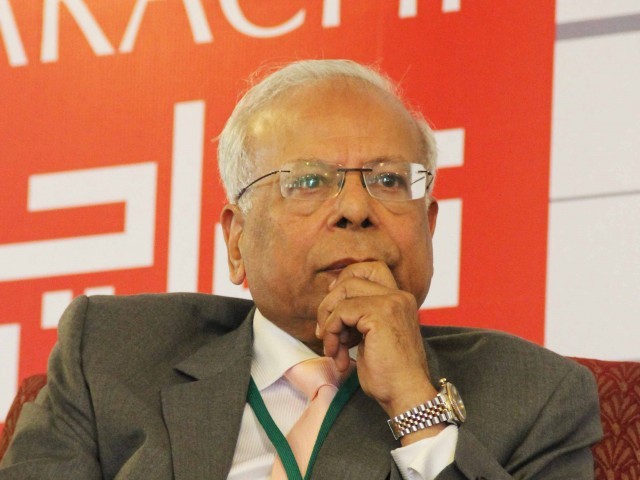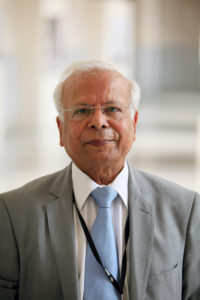Interview: Dr Ishrat Hussain

Facts presented in your latest work, Governing the Ungovernable, show that military rulers have provided better governance compared to elected governments, and that elected leaders rolled back many reforms and weakened institutions. How can we manage this dichotomy?
Extra-constitutional regimes suffer from illegitimacy and, therefore, deepen democratic malaise. The economic policy reforms create winner and losers and have to be mediated through negotiations, compromises and consensus-building. Only elected regimes can perform this act, as they are aware of the consequences of the choices they make.
There is a clear exit pathway under democratic regimes as voters can throw out the ruling party if they are not satisfied with its performance. This is not possible under any other form of government. Both benign or malevolent autocrats can perpetuate themselves in power because the people have no recourse to remove them and either have to wait and see, or take up arms.
Reforms introduced by the military leaders were reversed because they didn’t enjoy legitimacy. The booms and busts in Pakistan’s economic cycle can be ascribed to this discontinuity in the implementation of economic policies and reforms. India’s economic growth trajectory took off when the BJP government continued the same policies introduced by Congress in 1991. Both foreign and domestic investors got reassured that the old license and permit raj was over and the new liberalised and deregulated regime has taken hold irrespective of the political party in power.
You say military rulers lack legitimacy, therefore, their reforms remain unsustainable, but elected leaders are said to be averse to reforms. They are accused of enacting laws, which perpetuate only family and class interests. Isn’t it a catch-22 situation?
The argument presented in the book is that uninterrupted democracy would pave the way for a performance-based electoral screening process. In 2013, Pakistanis exhibited this by rejecting the PPP at the Centre and the ANP at the provincial level. They voted for the PML-N as they felt that the Punjab government acquitted itself relatively well. The quality of political leadership would improve with the passage of time if those who are unable to deliver are routed out in the elections. Only those who do well for the larger collective good would be rewarded.
What reforms are needed to ensure that democracy in Pakistan works for the public good rather than serving the interest of the few?
As urbanisation and peri-urban towns expand, and the middle-class connected with the world rises, education will spread and civil society will become vibrant. There will be a shift from patronage-based to performance-based politics, in which the delivery of public goods and services to citizens would carry greater weight in the calculus of choosing parties and candidates at the time of elections.
Historical evidence suggests that the attrition rate among the elected legislators from the urban constituencies is comparatively higher than those from the rural constituencies where biradari, kinship, tribal and feudal infuences are still pervasive. I was disappointed by the results of the 2017 Census, which show a lower ratio of urban population than expected. Other studies and anecdotal evidence show that the urban and urbanising population accounts for at least half of the total population. The entire corridor between Rawalpindi to Lahore, along the GT Road, Lahore-Sheikhupura-Faisalabad and Sialkot-Daska-Gujranwala, are manifestations of this trend.
Your book explains that Pakistan was ahead of its neighbours, including India, in the first four decades of its independence. Then we had the unstable ’90s, in which four elected governments failed to complete their terms. The Musharraf-era witnessed high growth, but the economy derailed again. What is the best way to break this cycle?
Economic growth has to be sustained over time and has to be equitable in the distribution of benefits. Markets and the private sector should be given greater space to improve productivity and efficiency, while the state must tax the rich and spend on basic services, the education, training and skill and asset development of the poor. All political parties should publicly announce that this is the economic pact under which they will work. It will give investors and the public a clear direction and guidance about the future. They must realise that the challenges of globalisation, demography, the youth bulge and growing urbanisation would place an enormous burden on any incoming government. A concerted and continuous attack on each of these problems would take time — longer than a five-year electoral cycle.
 You hold Zulfikar Ali Bhutto responsible for inflicting two major blows on Pakistan. First, through nationalisation, which hit the private sector; second, the weakening of civil institutions, especially the civil service. Now there is a consensus on privatisation, but no efforts are in sight to reform the civil service. How could one introduce reforms in the civil service given the political parties’ opposition?
You hold Zulfikar Ali Bhutto responsible for inflicting two major blows on Pakistan. First, through nationalisation, which hit the private sector; second, the weakening of civil institutions, especially the civil service. Now there is a consensus on privatisation, but no efforts are in sight to reform the civil service. How could one introduce reforms in the civil service given the political parties’ opposition?
You are quite right. No effort has been made by the successive governments, military or civilian, to bring about reforms in the civil service — the backbone of institutions of democratic governance. The report by the National Commission for Government Reforms (NCGR) made comprehensive recommendations, but it remains in cold storage since 2008, despite the fact that every prime minister felt that inefficiency and corruption impede economic progress. In the absence of reforms, we may not be able to have a buoyant and dynamic economy that would create jobs for the 1.5 million youth entering the labour force in the coming decades. We would continue to have a burgeoning informal sector, unplanned urbanisation, congested cities and a decrepit infrastructure, which, instead of enhancing productivity, contribute to value subtraction.
There is a lot of controversy regarding the 18th Amendment, which empowered provinces and flushed them with resources. But its critics say the amendment has weakened the federation. The key objections are that provinces lack the capacity to handle resources and provincial governments are reluctant to devolve power to the local governments. Do you feel the need to address these concerns?
I am a great believer in the further devolution of powers and decentralisation to local government level. An ordinary citizen’s point of contact with the government is the patwari, SHO, irrigation overseer, head teacher, health practitioner, and water and sanitation official. All these services should be provided at the doorstep of the community and should not be controlled by the provincial capitals. To promote equity, the Provincial Finance Commissions (PFC) should give greater allocations to backward districts. Regular monitoring and evaluation, auditing of financial expenditures and target-setting should be done by the provincial departments. In this way the capacity constraint would be relaxed and the service provision would be responsive to the needs of the communities/villages and financial probity would also be ensured. The National Economic Council (NEC) and the Council of Common Interests (CCI) should be strengthened to bring about greater coordination between the federal and the provincial governments in formulating and monitoring national policies, plans and budgets.
Local bodies are seen as the main pillar of any genuine democratic dispensation, but our major political parties stand opposed to it. Why?
The reason for the lack of interest in empowering and resourcing the local governments has to do with the tension between the MPAs, ministers and secretaries on the one hand, and the District Nazims on the other. Under a well-functioning local government system, the powers do pass on from the provincial ministers and secretaries to the Nazims, thereby resulting in dilution of the influence of local MPAs in their constituencies. This has resulted in legislation that has made local government bodies impotent and ineffective. Rather than sabotaging the system, MPAs should contest and capture the positions of Nazims as Shah Mehmood Qureshi did in 2002. With a population of over 200 million, the present concentration of administrative and financial powers in the provincial governments would prove counterproductive for political parties.
How do you view the tussle between the key institutions of state?
The tussle has arisen due to imbalances among the three organs of the state. While the executive has become too strong and the judiciary hyperactive, the parliament has had the weakest record so far. The power of oversight and vigilance by parliament, over the abuses and misuse of power by the executive, has been almost non-existent. The opposition has also not played the role that it ought to. The prime minister and ministers do not turn up regularly at the parliamentary sessions, nor do the leaders of the main opposition parties. The Q and A hour, which is a powerful tool for disclosure and accountability, has become perfunctory. The Public Accounts Committee (PAC) does not get updated reports, while the competence of officials in the Audit Department is highly questionable. Budget sessions are full of rhetoric and clichés rather than a careful analysis of the documents presented.
A weak parliament has given rise to the ascendancy of the NAB, FIA, media and courts, which have created an atmosphere of fear among the honest and hard-working public servants, who are shy of taking decisions. The military comes into the picture out of its concern for the state of economic, political and social affairs in the country. The vacuum created by the inability of the civilian institutions to deliver has been filled by the military. To give you an example, Karachi became peaceful and free of terrorists only when the Rangers took command, as the police had become too politicised and corrupt. If each organ of the state remains within its respective boundary and exercises checks and balances, then the need for the military to assert itself may not arise.
You have called for the restructuring of institutions. Can you briefly explain the key steps that are required immediately?
As comprehensive reforms of governance are not politically palatable across the board, I identified those key institutions which, when reformed and restructured, may have a spillover effect on the functioning of other institutions. These institutions have been selected to meet four pressing national objectives – growth, equity, security and accountability. Each institution selected has a contribution to make in meeting one of these four objectives. For example, if the Federal and Provincial Public Service Commissions are manned by persons of integrity and high competence, they would recruit persons on merit rather than political connections. Once these individuals are assigned to police, customs, districts and so on, they would carry out their duties fearlessly as they do not owe their jobs to any politician.
Is ‘governing the ungovernable’ possible? Does our political order allow space for vital reforms, or do we need to reset the system?
I am an eternal optimist and do not give up. When the report of the NCGR (which I headed along with six private sector members and six government secretaries) was not accepted by past governments, my friends advised that it was a waste of my time and energy to persist. I did not accept their advice, and instead changed the strategy. When I realised these comprehensive recommendations have no chance of getting implemented, I pondered at the second or third best solution to this problem. This book is the culmination of that thought process. I have focused on 24 key institutions. Politically, this would not have such wide repercussions and the possibility of getting some traction on these proposals appear fairly reasonable. If that does not happen, I would go back to the drawing board and start thinking and working on an alternate strategy.
Amir Zia is a senior Pakistani journalist, currently working as the Chief Editor of HUM News. He has worked for leading media organisations, including Reuters, AP, Gulf News, The News, Samaa TV and Newsline.


